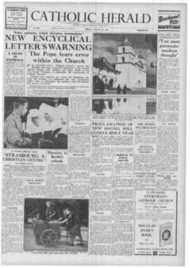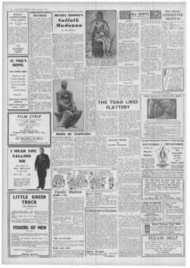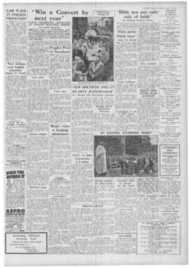Page 3, 25th August 1950
Page 3

Report an error
Noticed an error on this page?If you've noticed an error in this article please click here to report it.
Tags
Share
Related articles
Ireland No Dump
Maynooth Summer School
Moscow Link
School Segregation
The Pantomime Of Bernadette
MORE ABOUT IRISH ACTING
TIIE senior Catholic drama Critic in these islands, I should say, is Mr. Gabriel Fallon who occupies a stall for the Dublin Standard. In his courteous
way, Mr. Fallon recently rebuked Mr. Ivor Brown and me because coincidentally in concert we sighed for the good old days
of Irish acting. Our fears of its demise were exaggerated; in the little theatre by the Liffey there is promise of good things yet to be.
In consequence of Mr. Fallon's essay I have been examining my conscience and with intensified zeal such samples of Hibernian histrionics that come my way. For Mr. Fallon is an uncommonly good judge of acting and its context, the fused subsidiary arts of writing and production ; so far as I know he is the only drama critic writing in English who served his apprenticeship as an actor, and to wide studies in European drama he adds reading in Catholic thought. As a boy I found pleasure and profit in his work for the Jesuit review, The Irish Monthly. I am glad to acknowledge the debt I owe him.
SCOTCH CABBAGE When Mr. Fallon tells me that the Irish theatre has reserves of strength of which I am unaware, I accept his judgement and look forward to seeing the young McCormacks and younger Cusacks now secreted in the sleeve of Cathleen in Houlihan learning their trade. But presently I am engaged upon the night to night business of contemporary criticism and the only faith I have in the future is that, in God's good time. it will arrive; and I may not he about then. I believe what I see each night ; last night I saw Mr. Louis D'Alton's The.y Cot What They Wanted (PHOENIX). And I did not believe it. I was unimpressed by this " Abbey Theatre success."
It is what in Scotland is termed " cauld kale," yesterday's cabbage =mikes' into the semblance of a meal and served to poor folk whose taste rosy be variable but whose diet
is inevitable. They take what they get. Sometimes it is made palatable for cabbage broth is healthy food. Mr. D'Alton's cabbage is endurable fare hut the cooks are curiously concocted into what is billed as a " full Irish company."
LIMPING BLARNEY The writing is based upon the subplot of O'Casey's Juno and the Paycock, and it was a good plot before O'Casey heard of it. Mr. D'Alton efficiently whips it into three acts of kitchen farce. Bartley Murnaghan, the improvident father of an incompetent fat-oily, on the basis of a rumoured American legacy gains monetary credit and spins it into fortune. The part is essentially Irish, the dialogue lyrically idiotic and amusing; the situation calls for Celtic bravura. It was, I suspect, written for F. J. McCormack.
To say the least of it, Mr. Mark Daly, who plays Bartley, is not a McCormack, and I am not convinced that he is Irish. His accent is Lowland Scottish. I shall not dwell upon the details of his work for here it is, I believe. miscast. A Highland Scot, with voice refined by the music of Gaelic, can essay this type of role with tolerable grace, but in a Lowland mouth verbal blarney is as likely to survive as Dresden china in a cement mixer. Mr. Daly. as his name implies, may be Irish but that voice, I wager, was conditioned by breezes that hardly by-passed the Clyde. He cannot play a Southern Irishman and Mr. D'Alton's play stands or falls by this role.
My fears for the Irish theatre are, however, summed by three young men who should be the main support of this player. Human nature being what it is, we expect to see the best young actors in the West End. The wages are better and even if players can live on " glory." their children continue to have materialistic appetites for mink and oysters. If the three young men in They Got What They Wanted are the cream of Irish acting, in their generation. and artistic ambition, I am nonplussed by Mr. Fallon's faith in the future.
COMPLEX BADNESS 1 hey play brothers, the sons of the prodigal father. The eldest, who, his publicity man tells England, is one of Ireland's " glamour family," is tall, dark, handsome and leers ; throughout the play he wore an expression of oafish sarcasm which may be male glamour. The second " brother" has a style of acting which appears to be based on the methods of signalling in the Royal Navy. He uses his neck like a stick and waves his head like a flag send big, I conjecture, messages. His lines are enunciated in the tones our aunts use to call chickens to food. I do not read semaphore, and there were, alas, no chickens in the audience. The third boy bounces. Not one of these imports is better than a bad amateur.
BLESSED RELIEF As two daughters, Miss Sheila Martin and Miss Patricia Driscoll, in the original production. provided blessed relief from what Mr. Ivor Brown aptly described as the "shouting and banging about" of Mr. Frank Dermody's production. At the Phoenix they have been supplanted by glamour that may or may not be Irish, wearing dresses that suggest M. Christian Dior passed that way. Miss Martin and Miss Driscoll knew how to stand still and look like human beings. They were inexperienced but obviously intelligent.
In other and good roles Mr. Liam Redmond, Mr. Joe Linnane, and Mr. Malachi Keegan were veraciously Irish, in this context the first two seeming heaven-sent geniuses.
But tor the purpose of judging the coming Irish theatre the youths ate
more significant. Their badness is further complicated by clichés that normally only experienced artists, like Mr. Redmond and Mr. Linnane, must guard themselves from. These apparently are their stock and part of their education_
blog comments powered by Disqus









